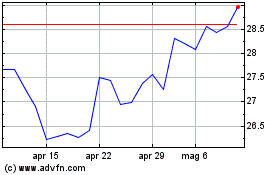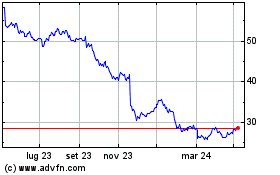Extortion Charges Embroil Lawyer Involved in Roundup Litigation
19 Dicembre 2019 - 2:21PM
Dow Jones News
By Sara Randazzo and Jacob Bunge
This fall, Virginia plaintiffs' attorney Timothy Litzenburg
allegedly laid out a proposal to a chemicals company that supplies
ingredients used in the popular weedkiller Roundup.
According to a federal criminal complaint filed this week, one
of Mr. Litzenburg's clients was preparing to sue the company for
its role in making Roundup, which has been blamed for causing
cancer. Thousands of other lawsuits were likely to follow. But the
problem could go away for a $5 million settlement, he allegedly
told the company, plus a "reasonable" $200 million in consulting
fees paid to Mr. Litzenburg and two associates.
Instead of paying, the company called the U.S. Justice
Department, according to the complaint.
Federal prosecutors with the Justice Department's fraud section
charged Mr. Litzenburg this week with extortion, laying out the
alleged scheme to extract $200 million from a target they identify
as "Company 1."
That company is Amsterdam-based chemicals maker Nouryon,
according to people familiar with the matter. Nouryon is the former
chemicals unit of Akzo Nobel NV, which a consortium led by
private-equity firm Carlyle Group LP bought in 2018 for $12.6
billion.
Mr. Litzenburg was arrested Tuesday and released on bail. His
attorney, Thomas Bondurant Jr., said Wednesday his client isn't
guilty and that there appear to be inaccuracies in the charging
document. A Nouryon spokesman said, "We have nothing to contribute
to the ongoing DoJ investigation." A representative for Carlyle
didn't respond to requests for comment.
The charges come against the backdrop of the broader Roundup
litigation, which has roiled Bayer AG, the German company that owns
the weedkiller. Bayer faces lawsuits from more than 42,700 farmers,
home gardeners and landscapers who claim Roundup caused non-Hodgkin
lymphoma and other cancers. It is fighting the claims.
The criminal complaint unsealed Tuesday against 37-year-old Mr.
Litzenburg details the lawyer's alleged attempt to shift the
Roundup litigation into a new phase that would target chemical
suppliers involved in the herbicide's production.
"The [Company 1] non-Hodgkin lymphoma litigation that we are
planning will be 'Roundup Two,' and I'm excited to lead the charge
again," Mr. Litzenburg said in an Oct. 24 email to an attorney
representing the company, as quoted in the complaint. "This time,
to my great financial benefit."
Prosecutors allege Mr. Litzenburg first approached the chemicals
company in September with the draft of a complaint that he planned
to file claiming chemical compounds it and other suppliers provided
to Bayer were carcinogenic and that they failed to warn about the
risks.
He would forget the lawsuit, he told them, if they entered into
a $200 million consulting agreement that would purportedly give him
a conflict of interest that would make him unable to sue the
company, according to the complaint. The money, he made clear,
wouldn't be used as a payout to Roundup users to resolve any
lawsuits, but would go to him and two lawyers in Chicago and
Virginia.
Over a series of phone calls and emails detailed in the
complaint, he described the fee as reasonable, saying in the Oct.
24 email: "The defense costs and cost to ultimately resolve the
thousands or tens of thousands of cases would be well into the
billions, setting aside the associated drop in stock price and
reputation damage."
Mr. Litzenburg said that absent "a so-called 'global' or final
deal with me, this will certainly balloon into an existential
threat to [Company 1]."
The Justice Department recorded phone calls and a meeting
between Mr. Litzenburg and attorneys for the company after the
company approached the department about the initial
interactions.
Until last year, Mr. Litzenburg worked with the Miller Firm in
Virginia, which has been actively involved in the Roundup
litigation and played a lead role in the first Roundup case to go
to trial. That California state court case ended in a $289 million
verdict in favor of groundskeeper Dewayne Johnson, which was later
reduced to $78.5 million and is now on appeal.
On Wednesday, attorney Michael Miller said Mr. Litzenburg was
fired by the Miller Firm in September 2018 and that the firm has
nothing to do with the events laid out in the DOJ's criminal
complaint.
In an email to The Wall Street Journal last month, Mr.
Litzenburg laid out what he called his passion for holding
companies accountable for selling harmful products and his dismay
at what he views as an overly cozy relationship between industry
and regulators.
"These companies make willful, knowing choices to put deadly
products in the market anytime they figure their profits will far
exceed any sort of 'penalty' they have to pay in lawsuits when
people figure it out," he wrote.
He added: "I sleep well at night knowing I am helping injured
people as best as is currently possible."
Write to Sara Randazzo at sara.randazzo@wsj.com and Jacob Bunge
at jacob.bunge@wsj.com
(END) Dow Jones Newswires
December 19, 2019 08:06 ET (13:06 GMT)
Copyright (c) 2019 Dow Jones & Company, Inc.
Grafico Azioni Bayer (TG:BAYN)
Storico
Da Mar 2024 a Apr 2024

Grafico Azioni Bayer (TG:BAYN)
Storico
Da Apr 2023 a Apr 2024
